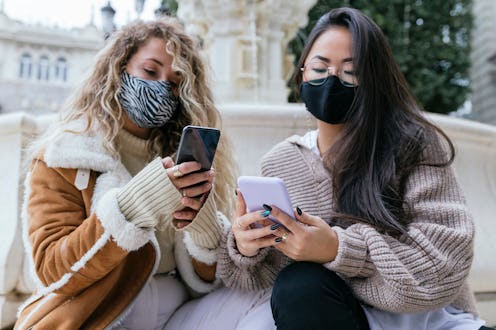Health
All The Ways The New COVID-19 Variants Differ From The Original Strain
Plus, what you can do to help stop the spread.

With rates of new COVID variants on the rise, people across the country are double-masking and re-upping their social distancing standards to protect against potentially more contagious variants. But what does it mean if you're infected with a new COVID variant versus being infected with the original strain? Do the new COVID variants have different symptoms from regular COVID?
Why Are There New Variants Of COVID-19?
Researchers have reported new variants of COVID that can be traced back to the UK, Brazil, and South Africa. There are also new variants identified in California and New York. These variants are the same virus at their core, but the proteins that help the virus latch onto your body's cells have changed. "Most viruses mutate over time in order to improve their chances of surviving as human bodies learn to fight off the virus," says Dr. Sanjeev Jain, M.D., a doctor double-board certified in immunology and internal medicine at Columbia Asthma and Allergy Clinic.
Just because new variants are normal, however, doesn't mean you don't have to take them seriously. "While cases are overall declining, that variant is doubling roughly every 10 days in the U.S. and could become the dominant strain," says Dr. Natasha Bhuyan, M.D., a family physician with One Medical, referring to the UK variant B117. That's because that variant seems to be anywhere between 40-70% more transmissible than the original strain — AKA, it's more contagious.
Are New COVID Variant Symptoms Different?
People who get sick with a new COVID variant won't notice any additional or different symptoms. "These new COVID variants still induce the same symptoms as the original virus that was detected," Dr. Jain tells Bustle. "These symptoms include fever, chills, cough, shortness of breath, difficulty breathing, fatigue, muscle aches, body aches, headache, new loss of taste or smell, sore throat, congestion, runny nose, nausea, vomiting, and diarrhea."
Dr. Jain adds that some reports have found that each variant may induce certain symptoms more often than others — for example, the B117 variant seems to give more people coughs than loss of taste or smell — but there aren't any new or unique symptoms being reported across the variants.
What Do The New COVID Variants Mean For Day-To-Day Life?
As these new COVID variants take center stage of pandemic life, it's reasonable to wonder what fresh changes to everyday activities they're bringing with them. "Continue to monitor for the symptoms mentioned above, and be aware that these new variants may spread more easily and quickly from person to person," Dr. Jain advises.
"The good news is, we know what is effective at curbing that spread," Dr. Bhuyan tells Bustle. Continue to social distance, she says, and get vaccinated when you're eligible — because yes, the available vaccines are effective against new variants. And make sure you're masking (or double masking) properly. "The Centers for Disease Control and Prevention (CDC) said recently it’s more effective to either double mask with a cloth mask over a surgical mask or wear a surgical mask that is knotted at the ear loops with the sides tucked in for a snug fit," she explains. In other words, new variants mean the same old prevention methods — plus, perhaps a bit of an update to your masking game.
Experts:
Dr. Natasha Bhuyan, M.D., family physician, One Medical
Dr. Sanjeev Jain, M.D., doctor double-board certified in immunology and internal medicine, Columbia Asthma and Allergy Clinic
This article was originally published on